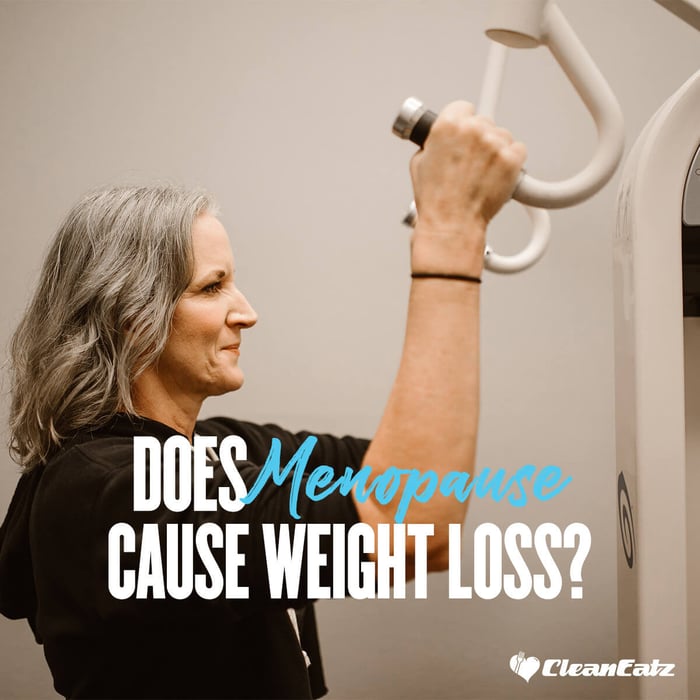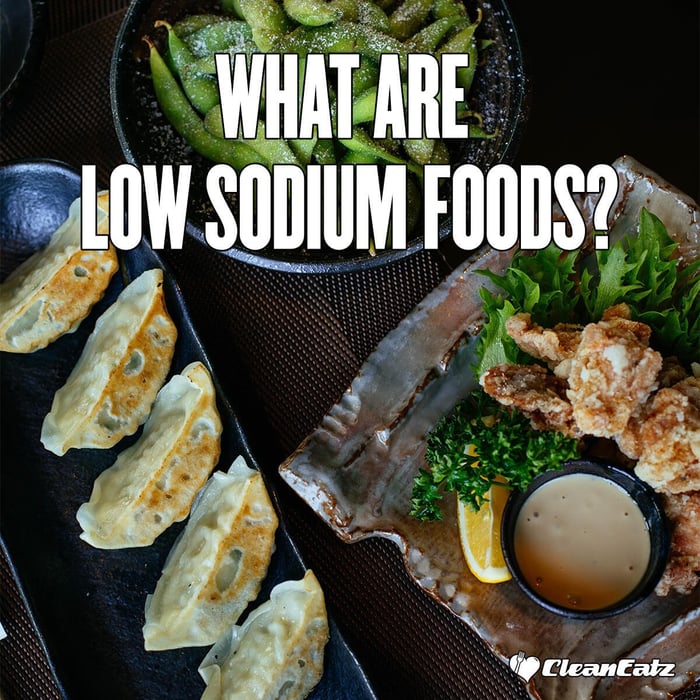Does Menopause Cause Weight Gain? Evidence-Based Solutions (2025)

Diana Ketchen
Nutrition
|
Weight Loss
|
Healthy Lifestyle
10/10/2025 8:49am
15 minute read
Table of Contents
- Does Menopause Cause Weight Gain?
- Why Menopause Changes Your Body Composition
- Evidence-Based Strategies for Weight Management During Menopause
- What About Popular Diets and Supplements?
- Setting Realistic Expectations
- Final Thoughts
- Frequently Asked Questions
- Does menopause directly cause weight gain?
- Why does belly fat increase during menopause?
- How much protein should I eat during menopause?
- Can hormone replacement therapy (HRT) help with weight gain?
- What type of exercise is best for menopause weight management?
- Do menopause supplements work for weight loss?
- References
If you've noticed the scale creeping up since entering perimenopause, you're not alone. Welcome to one of the most frustrating aspects of the menopause transition—weight gain that seems to appear out of nowhere, even when your eating and exercise habits haven't changed. While menopause gets blamed for those extra pounds, the truth is more nuanced, and more importantly, there are evidence-based strategies that can help.
Today we'll explore what the latest research reveals about menopause and weight management, including:
- Why hormonal changes lead to weight gain and belly fat
- The science behind metabolic shifts during menopause
- Evidence-based strategies that actually work
- The role of hormone replacement therapy
- Realistic expectations for weight management
Does Menopause Cause Weight Gain?
The short answer: it's complicated. While menopause itself may not be the sole cause of weight gain, the hormonal changes during this time play a significant role.1
Research paints a clear picture of what to expect:2,3
- Women gain an average of 1.5kg (3.3 pounds) per year during the perimenopause transition
- This amounts to approximately 10kg (22 pounds) of weight gain by the time menopause is reached
- Over 50% of women experience weight gain during perimenopause and menopause
- About 20% of women gain 4.5kg or more during this transition
- Weight gain affects both women who were previously at a healthy weight and those who were already overweight
The key insight from recent research: While aging contributes to weight gain (averaging 0.5kg per year for all adults), the hormonal changes of menopause accelerate this process and—critically—change where that weight accumulates on your body.4
Why Menopause Changes Your Body Composition
Understanding what's happening inside your body during menopause helps explain why maintaining your weight becomes more challenging. Several interconnected factors are at play:
Declining Estrogen Levels
Estrogen is one of the main hormones that regulate female body composition. When estrogen levels drop during menopause, multiple changes occur:5
- Fat redistribution: Fat shifts from your hips and thighs to your abdomen and upper body
- Increased visceral fat: More fat accumulates deep inside your belly, between your organs
- Changes in fat cells: Recent research shows the number of fat cells actually decreases, but each fat cell stores significantly more fat
- Increased hunger signals: Low estrogen may increase hunger signals from your brain, making you feel hungrier throughout the day
This visceral fat is particularly concerning because it increases your risk of:6
- Cardiovascular disease
- Type 2 diabetes
- High blood pressure
- High cholesterol
- Metabolic syndrome
Muscle Mass Loss
During menopause, women experience a reduction in lean muscle mass (also called fat-free mass). This matters because:7
- Muscle burns more calories at rest than fat tissue
- Less muscle means a slower metabolic rate
- Your body requires fewer calories to maintain the same weight
- If you continue eating the same amount, weight gain becomes inevitable
Studies show that even if the number on the scale doesn't change dramatically, your body composition shifts toward a higher ratio of fat to muscle.
The Protein Leverage Effect
A fascinating 2023 study identified a mechanism called the "Protein Leverage Effect" as a trigger for menopause-related weight gain.8 Here's how it works:
- During menopause, your body experiences enhanced protein breakdown
- This protein loss triggers increased appetite, specifically for protein
- If you don't increase your dietary protein concentration, you end up eating more total food (and calories) to satisfy your protein needs
- This excess non-protein energy intake leads to weight gain
The good news? The study shows that increasing dietary protein concentration by just 1-3% can help prevent or reduce menopause-related weight gain and preserve lean tissue.8
Metabolic Changes
Recent research from 2024-2025 reveals that metabolism changes in multiple ways during menopause:9
- Fat metabolism: Your body processes fat differently after menopause
- Blood sugar control: Blood sugar levels are higher both during fasting and after eating
- Inflammation markers: Inflammation levels increase in postmenopausal women
- Energy expenditure: Total and resting energy expenditure decrease
Gut Microbiome Disruption
Your gut microbiome—the collection of bacteria in your digestive system—plays a crucial role in metabolism and weight management. Research shows that:9
- Hormonal changes during menopause disrupt the diversity of gut bacteria
- The microbiome is linked to estrogen levels and menopausal state
- Changes in gut bacteria may contribute to bloating, digestive issues, and weight gain
- A disrupted microbiome can affect how your body responds to food
Evidence-Based Strategies for Weight Management During Menopause
Now for the good news: while menopause makes weight management more challenging, research shows specific strategies can help you maintain a healthy weight and body composition. These approaches are backed by scientific evidence, not marketing hype.
1. Prioritize Strength Training (This Is Non-Negotiable)
If you take away one thing from this article, make it this: strength training is the most important exercise for menopause weight management.10
Here's why strength training is essential:
- Builds and preserves muscle mass that naturally declines during menopause
- Increases your resting metabolic rate (you burn more calories even at rest)
- Improves insulin sensitivity and blood sugar control
- Strengthens bones and reduces osteoporosis risk
- Helps reduce visceral (belly) fat
What the research recommends:
- Aim for 3-5 strength training sessions per week
- Use weights, resistance bands, or bodyweight exercises
- Focus on major muscle groups: legs, back, chest, core
- Start with lighter weights and gradually increase
- Consider working with a trainer initially to learn proper form
Examples of effective exercises:
- Squats and lunges
- Push-ups (modified as needed)
- Rows with resistance bands or dumbbells
- Planks and core work
- Deadlifts with appropriate weight
Don't skip cardio entirely, but make strength training your priority. Walking 7,000+ steps daily and incorporating some moderate cardio (30 minutes, 3x per week) complements your strength routine.10
2. Increase Your Protein Intake
Based on the protein leverage research, increasing your protein intake is crucial for preventing menopause-related weight gain and muscle loss.8
How much protein do you need?
- Aim for 18-20% of your total daily calories from protein
- For most women, this translates to 100+ grams of protein per day
- If you're physically active, you may need even more
- Spread protein intake across all meals, not just dinner
Best protein sources during menopause:
- Lean meats: chicken breast, turkey, lean beef
- Fish and seafood: salmon, tuna, shrimp
- Eggs and egg whites
- Greek yogurt and cottage cheese
- Legumes: beans, lentils, chickpeas
- Tofu and tempeh
- Protein powder (whey or plant-based) if needed to meet targets
Higher protein intake helps you feel fuller longer, preserves muscle mass during weight loss, and may naturally reduce overall calorie intake without leaving you hungry.
3. Follow a Mediterranean-Style Diet
Multiple studies show that a Mediterranean diet is one of the most effective eating patterns for menopause weight management.11
Key components:
- Plenty of vegetables, fruits, and whole grains
- Healthy fats from olive oil, nuts, and avocados
- Fish and seafood several times per week
- Moderate amounts of poultry, eggs, and dairy
- Limited red meat and sweets
- Herbs and spices instead of salt
Benefits for menopausal women:
- Reduces risk of weight gain during menopause
- Improves cardiometabolic risk factors
- May help reduce menopause symptoms
- Provides anti-inflammatory compounds
- Supports cardiovascular health
Looking for convenient, balanced meals? Our portion-controlled meal plans are designed with principles similar to the Mediterranean diet, making it easy to maintain healthy eating habits without the stress of meal planning and prep.
4. Manage Portion Sizes and Total Calories
Because your metabolism slows during menopause, you need fewer calories to maintain the same weight. This is an uncomfortable truth, but understanding it helps you adjust:7
- You may need 200-300 fewer calories per day than you did before menopause
- Focus on nutrient-dense foods that provide more nutrition per calorie
- Use smaller plates to naturally reduce portion sizes
- Eat slowly and mindfully to recognize fullness signals
- Avoid grazing throughout the day—stick to structured meals and planned snacks
Rather than following restrictive diets (which often backfire), focus on making sustainable changes to portion sizes and food quality that you can maintain long-term.
5. Prioritize Sleep
Poor sleep is both a symptom of menopause and a contributor to weight gain. The connection is significant:12
- Sleep deprivation increases hunger hormones and decreases satiety hormones
- When you're tired, you're more likely to crave high-calorie foods
- Poor sleep affects the hormones that tell your body when it's full
- Exhaustion reduces motivation to exercise
Strategies for better sleep during menopause:
- Keep your bedroom cool (hot flashes and night sweats disrupt sleep)
- Maintain a consistent sleep schedule
- Limit caffeine after 2 PM
- Avoid alcohol close to bedtime (it disrupts sleep quality)
- Create a relaxing bedtime routine
- Talk to your doctor if sleep problems persist—HRT or other interventions may help
6. Consider Hormone Replacement Therapy (HRT)
Here's something many women don't know: hormone replacement therapy is the most effective treatment for menopause symptoms, including weight-related changes.13
Research shows that estrogen therapy:5,13
- May help prevent menopause-related changes in body composition
- Specifically helps prevent the accumulation of abdominal fat
- Preserves lean muscle mass
- May help maintain resting energy expenditure
- Reduces other menopause symptoms (hot flashes, night sweats, mood changes)
Important considerations:
- HRT is not appropriate for everyone—discuss your individual risk factors with your healthcare provider
- Women with certain health conditions or history may not be candidates for HRT
- The benefits and risks vary based on your age, time since menopause, and health history
- HRT is most effective when started during perimenopause or early menopause
If you're struggling with menopause symptoms and weight management, talk to your healthcare provider about whether HRT might be appropriate for you. Many women avoid this conversation due to outdated concerns about HRT—current research shows it's safe and beneficial for many women when prescribed appropriately.
What About Popular Diets and Supplements?
Intermittent Fasting, Keto, and Low-Carb Diets
You've probably heard about these trending approaches. Here's what the research actually shows:14
Intermittent Fasting (IF):
- Some studies show potential for weight loss
- Research specifically on menopausal women is limited
- May help some women, but isn't more effective than other calorie-restriction methods
- Important to ensure you're meeting nutrient needs during eating windows
- Can be sustainable for some people but challenging for others
Ketogenic Diet:
- May promote initial weight loss by reducing appetite
- Long-term adherence is very challenging
- Risk of nutrient deficiencies, particularly fiber (important for menopausal women)
- Both the British Dietetic Association and Academy of Nutrition and Dietetics caution against it for weight management
- Limited evidence on long-term efficacy and safety
The bottom line: High-quality evidence supports calorie-reducing diets combined with increased exercise (especially strength training) for long-term weight management. These have data showing effectiveness over four years or more in perimenopausal and menopausal women.14
Menopause Supplements
The supplement industry markets many products claiming to help with menopause weight loss. Here's the truth:
Limited Evidence: Most menopause supplements have limited scientific evidence supporting their effectiveness for weight loss specifically. While some ingredients show modest benefits in small studies, they are nowhere near as effective as proven strategies like strength training, adequate protein intake, and hormone replacement therapy.15
Supplements with Some Supporting Evidence:
- Probiotics: May support gut health, which affects metabolism, but specific strains and dosages for weight loss during menopause are still being researched
- Phytoestrogens: Plant compounds that mimic estrogen may help reduce waist-hip ratio modestly, but effects vary based on individual health status
- Vitamin D and Calcium: Important for bone health (critical during menopause) and may slightly support metabolism, but not proven weight loss aids
- Protein powder: Can help meet increased protein needs, particularly whey protein which has shown benefits for reducing waist circumference
Supplements to Approach Cautiously:
- Maca: Limited evidence for weight loss despite popularity in menopause supplements
- Berberine: Shows promise for blood sugar and cholesterol but concerns about gut microbiome impacts; typically used short-term (under 6 months)
- Most proprietary blends: Often contain insufficient doses of active ingredients to reproduce research results
Important: Always consult your healthcare provider before taking supplements, especially if you're on medications or have health conditions. Supplements can interact with medications and may not be appropriate for everyone.
Setting Realistic Expectations
Let's talk about what successful weight management during menopause actually looks like:
Realistic goals:
- Preventing additional weight gain is a success
- Losing 5-10% of body weight has significant health benefits
- Maintaining muscle mass while losing fat is more important than the number on the scale
- Reducing waist circumference (visceral fat) improves health even without major weight loss
- Progress is slower than it was when you were younger—and that's normal
What research shows works:
- Consistency matters more than perfection
- Small, sustainable changes are better than dramatic overhauls
- Combining multiple strategies (diet, exercise, possibly HRT) is most effective
- Long-term success requires adapting to your body's new needs
"The goal isn't aggressive weight loss," explains one menopause specialist. "It's about preventing excessive weight gain, maintaining muscle, and protecting bone strength."12
Final Thoughts
Menopause brings real, measurable changes to your body that make weight management more challenging. The hormonal shifts aren't in your imagination—they genuinely affect your metabolism, body composition, hunger signals, and where your body stores fat.
But here's the empowering truth: you're not powerless against these changes. Evidence-based strategies can help you maintain a healthy weight and body composition during and after menopause:
- Make strength training a non-negotiable part of your routine
- Increase protein intake to 18-20% of total calories
- Follow a Mediterranean-style eating pattern
- Adjust portions to account for reduced calorie needs
- Prioritize quality sleep
- Consider hormone replacement therapy with your doctor
Most importantly, shift your mindset. Menopause is a natural transition, not a disease. Just as your body changed during puberty, it's changing again now. You're still the same woman—just in a new phase of life that requires different strategies.
Need support on your menopause journey? Our chef-prepared, portion-controlled meals take the guesswork out of nutrition, making it easier to get adequate protein and balanced nutrition without the stress of meal planning.
Frequently Asked Questions
Does menopause directly cause weight gain?
While menopause itself may not directly cause weight gain, the hormonal changes during this time significantly contribute to it. Research shows women gain an average of 1.5kg per year during perimenopause, totaling about 10kg by menopause. The decline in estrogen changes how and where your body stores fat, shifting it from hips and thighs to the abdomen.2,3
Why does belly fat increase during menopause?
Declining estrogen levels cause fat to accumulate around your midsection rather than your hips and thighs. This abdominal fat, called visceral fat, lies deep inside your belly between organs. Visceral fat is particularly concerning because it increases your risk of cardiovascular disease, type 2 diabetes, and other chronic conditions.5,6
How much protein should I eat during menopause?
Research suggests women in menopause should aim for 18-20% of their total calories from protein, or about 100+ grams per day for most women. Higher protein intake helps preserve muscle mass, boost metabolism, and may prevent weight gain through the protein leverage effect. Include lean proteins like fish, chicken, beans, Greek yogurt, and legumes with each meal.8
Can hormone replacement therapy (HRT) help with weight gain?
Yes, research shows that estrogen therapy may help prevent menopause-related changes in body composition, particularly the accumulation of abdominal fat. HRT is the most effective treatment for menopause symptoms overall. Talk to your healthcare provider about whether HRT is appropriate for you based on your individual health profile and risk factors.13
What type of exercise is best for menopause weight management?
Strength training is the most important exercise for menopause weight management. Aim for 3-5 sessions per week using weights, resistance bands, or bodyweight exercises. This helps preserve and build muscle mass, which naturally declines during menopause. Combine this with regular walking (7,000+ steps daily) and some cardio exercise for optimal results.10
Do menopause supplements work for weight loss?
Most menopause supplements have limited scientific evidence supporting their effectiveness for weight loss. While some ingredients like phytoestrogens and probiotics show modest benefits in small studies, they are not as effective as proven strategies like strength training, adequate protein intake, and hormone replacement therapy. Always consult your healthcare provider before taking supplements.15
References
- Davis SR, et al. Understanding weight gain at menopause. Climacteric. 2012;15(5):419-29. View study
- Fenton A, et al. Fat mass, weight and body shape changes at menopause—causes and consequences: a narrative review. Climacteric. 2023;26(4):381-387.
- Wing RR, et al. Weight gain at the time of menopause. Archives of Internal Medicine. 1991. View study
- Fenton A, et al. Weight, Shape, and Body Composition Changes at Menopause. Journal of Mid-Life Health. 2021. View study
- Ko SH, Kim HS. Menopause-Associated Lipid Metabolic Disorders and Foods Beneficial for Postmenopausal Women. Nutrients. 2020;12(1):202.
- Fenton A. Obesity and menopause. Best Practice & Research Clinical Obstetrics & Gynaecology. 2023. View study
- Hurtado MD, et al. Weight gain in midlife women. Current Obesity Reports. 2024;13(2):352-363.
- Simpson SJ, et al. Weight gain during the menopause transition: Evidence for a mechanism dependent on protein leverage. BJOG. 2023. View study
- ZOE. Menopause and Weight Gain: Why It Happens & How To Stop It. 2025. View article
- British Menopause Society. Nutrition and Weight Gain. 2023. View resource
- Barrea L, et al. Mediterranean diet as a medical prescription in menopausal women with obesity: a practical guide for nutritionists. Critical Reviews in Food Science and Nutrition. 2021;61(7):1201-1211.
- Nebraska Medicine. The truth about menopause and weight gain. 2025. View article
- Giannini A, et al. Menopause, Hormone Replacement Therapy (HRT) and Obesity. Endocrinology and Metabolism. 2018.
- Denby N. Weight loss and prevention of weight gain in menopause. Post Reproductive Health. 2025. View study
- Medical News Today. 5 of the best menopause supplements for weight loss. 2022. View article
Related Articles
Swimming For Weight Loss
7 minute read
What Are Low Sodium Foods?
6 minute read



